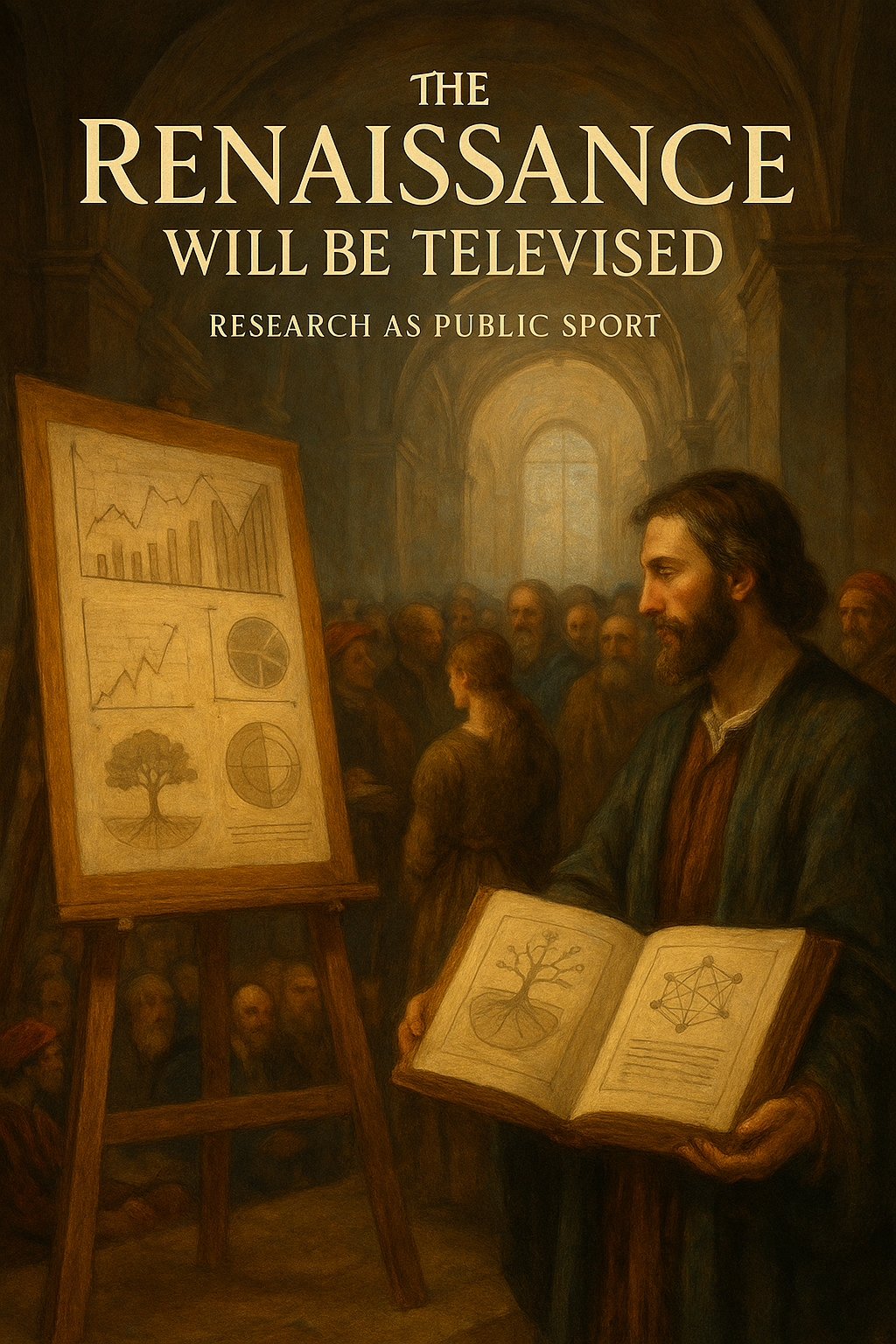For centuries, research has lived in the shadows.
Discovery happened behind closed doors, measured by papers no one read and prestige only insiders understood. The public saw the results — not the process.
That era is ending.
The next evolution of academia won’t be a new university. It will be a league — where research itself becomes a public sport, discovery is a live performance, and excellence is visible in real time.
I. From Ivory Towers to Arenas
Traditional academia was built around scarcity: scarce access to knowledge, scarce tools, scarce validation. The university’s value was its gate.
Today, AI and open data have blown that gate off its hinges. Anyone can learn from world-class professors online, replicate published experiments, or build on top of existing results.
When knowledge becomes abundant, the value shifts from possession to performance.
In the old world, research was rewarded for being published.
In the new world, it will be rewarded for being performed — clearly, collaboratively, and in public.
The university of the future looks less like a monastery and more like a stadium. Scholars are still scholars, but they’re also players in a global game of understanding, with audiences, referees, and leagues of mastery.
II. The League of Research
Imagine research as a structured competition — not to sensationalize science, but to make its rigor visible.
Each layer of academia becomes a tiered league, just like sports.
Undergraduate Tier: The Combine
Undergrad becomes the foundational league: logic, mathematics, writing, design, and scientific reasoning.
Students compete not for grades, but for clarity, adaptability, and reasoning speed — the same way athletes are evaluated for agility and reaction time.
Every class is a scrimmage. Every project is a match.
The best players get scouted for higher leagues.
Graduate Tier: The Clubs
Graduate labs evolve into “research clubs” — semi-autonomous teams with their own cultures, mentors, and open performance records.
Each club focuses on a signature domain: neuroscience, energy systems, cryptography, climate modeling.
They don’t publish papers once a year — they stream progress, collaborate across clubs, and build visible mastery.
Recruitment happens live, and so does failure — the ultimate coach.
Professional Tier: The Global League
At the top level, research becomes international competition:
publicly scored, transparently funded, ethically refereed.
Teams are ranked by discovery rate, reproducibility, and societal impact.
AI systems act as analysts — measuring contribution, validating data, and tracking meta-insight across the field.
This is not science fiction. It’s sportified science.
A system that rewards exploration, not conformity.
III. Visibility as the New Recruitment
In today’s academic system, the best thinkers often remain invisible until they earn the right credentials.
In a league-based world, visibility replaces permission.
- Top undergraduates rise through visible play: public reasoning battles, simulation tournaments, integrative design challenges.
- Independent researchers gain attention through “proof-of-insight” matches — showing live mastery by improving or refuting public models.
- AI referees act as scouts, identifying signal from noise across millions of experiments.
Just as the sports world discovered LeBron James in high school, the academic world will discover the next Einstein at sixteen — not through a transcript, but through a transparent record of performance.
Talent liquidity replaces institutional opacity.
IV. The New Incentive: Perform and Improve
The current academic incentive — publish or perish — rewards predictability.
You get grants for safe ideas that sound impressive in proposals.
You publish papers that confirm more than they reveal.
In the league model, the incentive flips.
You’re rewarded not for avoiding error, but for improving the collective model.
Every experiment is a visible move on the board. Every replication is a rematch.
Failure becomes educational — even honorable — because it’s part of the shared game.
Science stops pretending to be perfect.
It becomes what it’s always been at its best: a high-stakes sport of curiosity.
V. Culture: From Elitism to Conscious Meritocracy
Today’s universities still select for obedience — the ability to perform to rubric.
Tomorrow’s leagues will select for integrative awareness: how well a mind can combine logic, creativity, and moral clarity under pressure.
That means:
- No more hidden journals; every result is open, reproducible, and ranked in context.
- No more empty credentials; status flows from demonstrated contribution.
- No more invisible brilliance; the scoreboard keeps us honest.
This doesn’t degrade academia. It revives it — returning to the original Renaissance ideal, where art, science, and philosophy were public, participatory acts of excellence.
The humanist workshop becomes the global field.
VI. The MetaSPN Prototype: A League for Founders — and Thinkers
At MetaSPN, we’ve already begun building this architecture for innovation: founder pods that compete through predictive accuracy, ethical execution, and collaborative learning.
Now imagine applying that same model to academia:
- Pods as research labs, scored on transparency, impact, and reproducibility.
- Seasonal tournaments for solving open problems in physics, economics, or biology.
- Shared playbooks that turn every breakthrough into collective infrastructure.
It’s not about replacing universities — it’s about restoring their original spirit: a place where mastery is visible, learning is continuous, and progress is public.
This is how we make research legible to the world again.
VII. Greatness as a Decision
AI has democratized intelligence.
The next scarce resource is intentionality — the decision to play at the edge of your ability, where no one can guarantee the outcome.
In that sense, the future of academia isn’t about institutions at all.
It’s about players — the conscious competitors willing to make their process public and their mastery measurable.
The Renaissance is coming back.
But this time, it won’t be hidden in libraries or locked behind paywalls.
It will happen in the open — streamed, scored, and studied — a living, global exhibition of human potential.
Because in this new world, knowledge isn’t just a credential.
It’s a performance.
And the future’s brightest minds won’t just publish papers.
They’ll play for humanity’s scoreboard.
